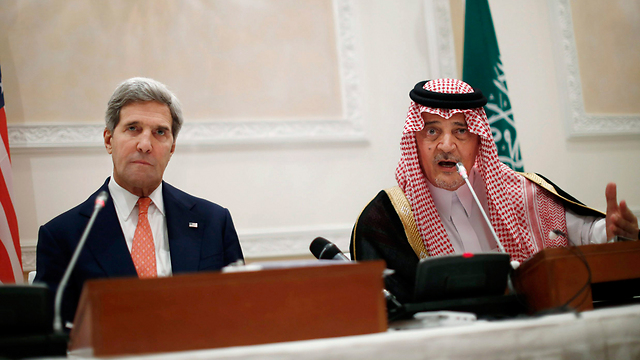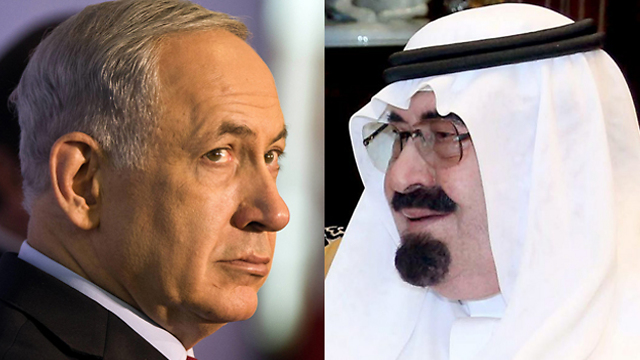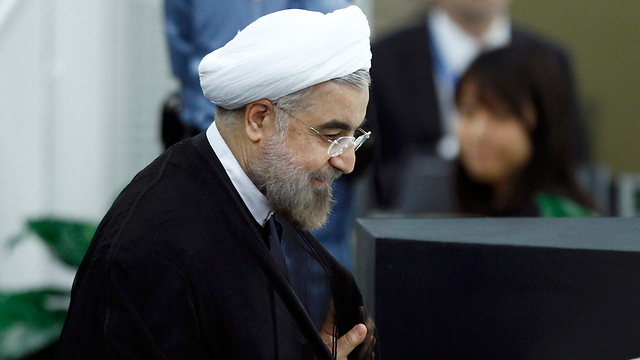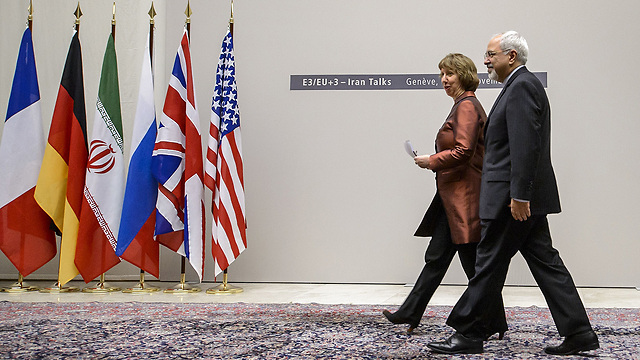
Saudis' choice: Iran or Israel
Analysis: Despite shared interests, there is little chance for normalization in Saudi-Israeli relations
Only Arabs left without nukes
Saudi commentators and reporters have recently expressed their despair over the Iranian-American agreement reached recently, which allegedly gives Iran legitimacy to enrich uranium. The Saudis have a bad feeling that in the near future the Arab world will find itself between two nuclear countries, Iran and Israel, while the Arabs are left without nuclear capabilities.
Saudi Arabia sees itself as the leader of the Arab world, an island of stability and economic power in the Arab world, which has weakened and is bleeding following the damages of the Arab Spring. It is also considered today the leader of the moderate Sunni world, and supports the secular Sunni forces – the Syrian rebel organization, the Free Syrian Army, and the Egyptian army fighting against the Muslim Brotherhood.
Saudi Arabia is anxiously monitoring the split within the Sunni forces, like the war between al-Qaeda groups in Syria and the Free Syrian Army and the tensions between Turkey and Egypt over Turkish Prime Minister Recep Tayyip Erdogan's support for the Muslim Brotherhood.

Saudi leaders are also losing sleep over the success of the Syrian regime's army, with the help of Hezbollah, in taking over most of western Syria. Iran's long arms are evident in Syria and Iraq, where a religious war is taking place between Sunnis and Shiites, and these two countries are on the verge of a split between east and west.
In Bahrain too the Iranian regime continues to incite the Shiite majority against the Sunni minority rule. The Saudis are now worried that lifting sanctions on Iran in the future will allow it to reinforce its support for Shiite groups in all of these arenas and deepen the Fitna – the religious war between Sunnis and Shiites.
Are we missing a historical opportunity?
The interests of Israel and Saudi Arabia in the Middle East have never been so close: They are both concerned over Iran's nuclearization, they both support General Abdel Fattah al-Sisi's war against the Islamists in Egypt, they are both interested in seeing Hezbollah fail in Syria, they both have an interest in weakening al-Qaeda and strengthening the moderate Sunni groups in Syria, and they are both disappointed with the United States' policy and feel it has abandoned them all alone in the region.
Saudi Arabia turned to Israel in 2002 through the Arab League proposal for comprehensive peace in the Middle East, in exchange for its return to the 1967 borders. Israel never officially accepted the proposal, although senior politicians like Ehud Olmert and Shimon Peres have expressed a positive attitude towards it.
Recently there have been many reports in the Arab press about secret cooperation between Israel and the Saudi Arabia. But these reports should be read cautiously as they usually appear in newspapers opposing Saudi Arabia. According to those sources, the meetings are being held in European countries. The content of these meetings in regards to the Iranian issue is unclear.
There is a claim that Saudi and Israeli intelligence officials are meeting in Jordan to coordinate cooperation on the Syrian issue. Syrian Deputy Foreign Minister Faisal Mekdad recently accused Saudi Arabia of cooperating with Israel against the Syrian regime. He said there was an "operations room" in Jordan where US, Saudi and Israeli intelligence officials were allegedly coordinating actions of the Syrian opposition.
The US created a serious crisis when it gave up on striking in Syria and reached an agreement with Iran, but it also opens new opportunities, if Saudi and Israeli leaders are wise enough to take advantage of them. Several optimistic Saudi commentators have even raised an interesting assumption that the Americans have no real intention of reconciling with Iran and that the current nuclear agreement for freezing some of the sanctions, which is valid for only six months, is just aimed at guaranteeing that Iran will support the destruction of chemical weapons in Syria.
Nonetheless, most Saudi commentators see the American policy as real treason against the kingdom and the Sunni world. One of them did a good job in describing the Saudis' feelings when he wrote that "the Great Satan (the US in Iran's eyes) is marrying the axis of evil (Iran in the eyes of the US) and the close friend (Saudi Arabia for the US) has not been invited to the wedding."
The Saudis have warned that US that it's betting on the wrong horse as the Sunnis are the majority in the Middle East and the Shiites are a minority (20% of Muslims) and because there is more Sunni oil than the oil in the Shiite areas.
Senior Saudi officials have spoken against Iran very similarly to Israel's leaders: "We won't sit idle if Iran has a nuclear weapon," "As far as we are concerned, all options are on the table." In addition, there has been open criticism about the Iranian propaganda and Saudi journalists have written that Iran has been promising to liberate Palestine for more than 30 years without doing anything, and that its vision is not uniting the Muslims but renewing the great Shiite Safavid Empire of the 16th century by turning into a nuclear country.
Second option: Joining winners
Saudi Arabia is facing a very difficult dilemma: If it draws closer to Israel it will betray the Palestinian issue, and if it joins Iran it will betray the Syrian opposition. The Wahhabi ideology, on the foundations of which the kingdom was established, is mainly anti-Shiite as it is anti-Israeli. The barriers of hatred for both countries are almost unbridgeable. The Saudi propaganda and education in the country are filled with the same amount of anti-Israel, anti-Jewish and anti-Shiite content.
But there are elementary differences between Saudi-Israeli ties and Saudi-Iranian ties on the religious and diplomatic levels: Jews are not allowed to visit the kingdom, and according to Islam they are banned entry to the area of the holy cities of Mecca and Medina.
Millions of Shiites, on the other hand, are permitted to make pilgrimages to the holy places, including many Iranians. In addition, Saudi Arabia's allies in the Gulf area are pressuring it to move closer to Iran. The Sultanate of Oman is the country which mediated between Iran and the US, Qatar and Kuwait have good relations in Iran, and the relations between the United Arab Emirates and Iran have been warming up recently. Abdullah bin Zayed, the UAE's foreign minister, even visited Tehran about a week ago.
Iranian President Hassan Rohani is now initiating a "smile offensive" in the Gulf area. He sent his foreign minister, Mohammad Javad Zarif, on a round of visits to all the Gulf emirates, and the latter expressed his hope to visit Saudi Arabia as well in the near future. The only emirate refusing to draw closer to Iran is Bahrain, which is accusing Tehran of the Shiite protest in the country.
Iran has called on Saudi Arabia to turn over a new leaf the relations between the two countries, and has repeated its claim that the development of Iranian nukes is exclusively for civilian purposes and that Saudi Arabia's fears are baseless. It appears, therefore, that the option of talking to Iran is easier than the almost utopian option of moving closer to Israel. Iranian and Saudi representatives have already sat together in conferences of the Islamic countries and the Organization of the Petroleum Exporting Countries (OPEC).
Despite the claims that the Saudi kingdom is holding secret ties with Israel, as Jordan did with Israel in the 50 years before the countries signed a peace agreement, there is no real proof of that. Iran and Saudi Arabia, on the other hand, have exchanged ambassadors and formally have normal diplomatic relations.
Saudi Arabia has expressed its hope in the past that the conflict with Iran would be settled in a diplomatic manner, but has never suggested talking directly to Israel. Therefore, there is a higher probability that Saudi Arabia will favor the Iranian option over the Israeli one. That way it will be able to fall into line with the US and maintain proper relations with the Americans, which the kingdom cannot afford to give up.
The expected result of Tehran's "smile offensive" will be a Saudi-Iranian dialogue which will generate a rare attempt for a Sunni-Shiite rapprochement. If and when such talks are held, there is no doubt that they will focus on the Syrian issue and that there will be an attempt to create a compromise supported by the two countries in the second Geneva convention. Such a dialogue will bring the two extremities of the Muslim world closer and push Israel further away from any attempt to reconcile with the Muslim world.
The Iranians will go on insisting on enriching uranium, and on the Iranian streets people will continue chanting proudly, "Death to America." The only one who can thwart the agreements on freezing the sanctions is Iran itself, as sooner or later the Americans and Europeans will realize that Tehran has no real intention of halting its race towards a nuclear bomb and hegemony in the Middle East.
Dr. Yaron Friedman, Ynet's commentator on the Arab world, is a graduate of the Sorbonne. He teaches Arabic and lectures about Islam at the Technion, at Beit Hagefen and at the Galilee Academic College. His book, "The Nusayri Alawis: An Introduction to the Religion, History and Identity of the Leading Minority in Syria," was published in 2010 by Brill-Leiden














